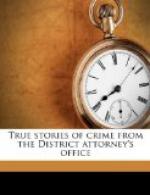At home they thought he was getting run down. His wife—! He was so kind and thoughtful that she had never been so happy. It made her fearful that he had some fatal disease and knew he was going to die. Up at the bank John made a separate bundle of sixty bonds out of the pile of six hundred so that he could substitute them for those first taken if the owner called for them. It was not likely that both owners would call for their bonds on the same day, so that he was practically safe until one or the other had withdrawn his deposit.
About this time the special accountants came around to make their annual investigation. It was apparently done in the regular and usual way. One examiner stood inside the vault and another outside, surrounded by four or five assistants. They “investigated” the loans. John brought them out in armfuls and the accountants checked them off and sent them back. When John brought out the one hundred and forty bonds left in the bundle of two hundred Overland 4s he placed on top of them the pile of sixty bonds taken from the other bundle of six hundred. Then he took them back, shifted over the sixty and brought out the bundle of six hundred Overland 4s made up in part of the same bonds. It was the easiest thing going. The experts simply counted the sixty bonds twice—and John had the sixty bonds (or Prescott had them) down the street. Later the same firm of “experts” certified to the presence of three hundred thousand dollars of missing bonds, counting the same bundle, not only twice, but five and six times! You see, Prescott’s John had grown wise in his generation.
After that he felt reasonably secure. It did seem almost unbelievable that such a situation could exist, but it was, nevertheless, a fact that it did. He expected momentarily that his theft would be detected and that he would be thrown into prison, and the fear of the actual arrest, the moment of public ignominy, the shock and agony of his wife and family, were what drove him sleepless into the streets, and every evening to the theatres to try to forget what must inevitably come; but the fact that he had “gone wrong,” that he was a thief, that he had betrayed his trust, had lost its edge. He now thought no more of shoving




